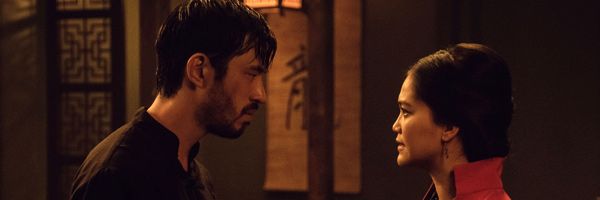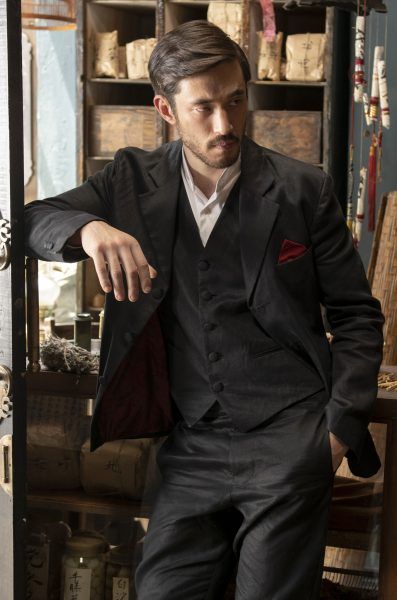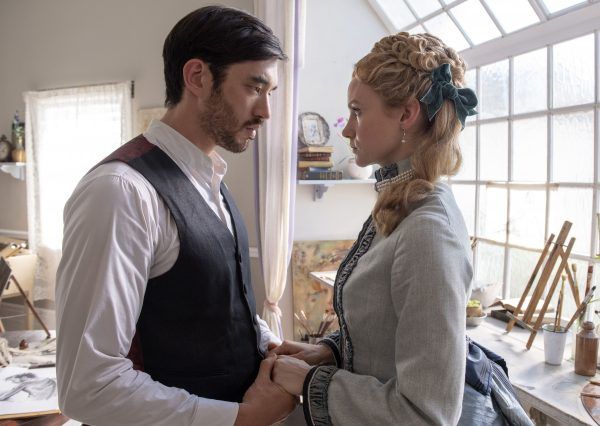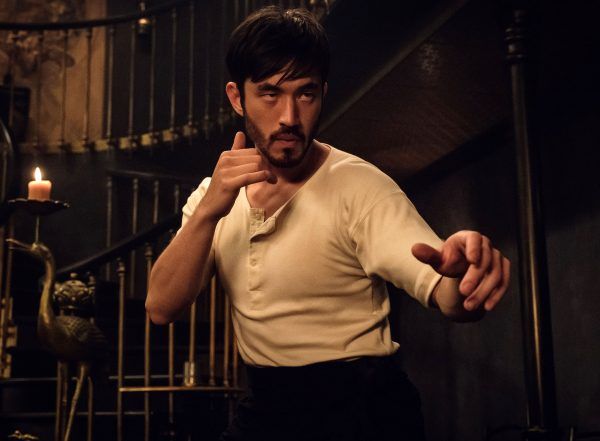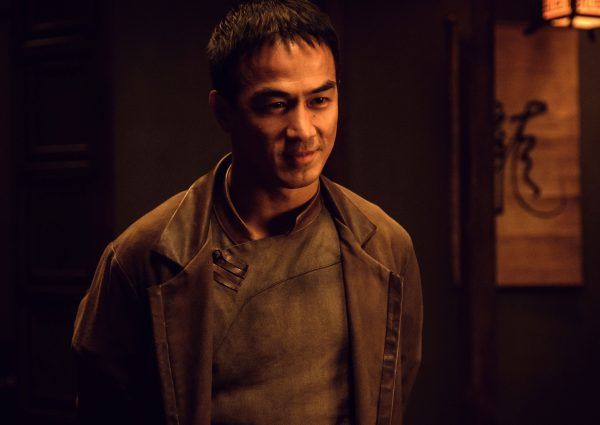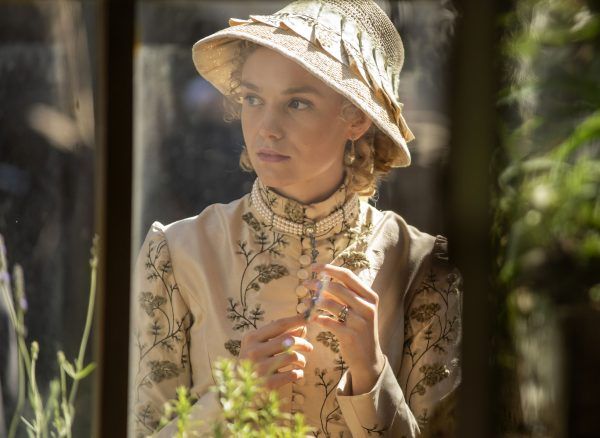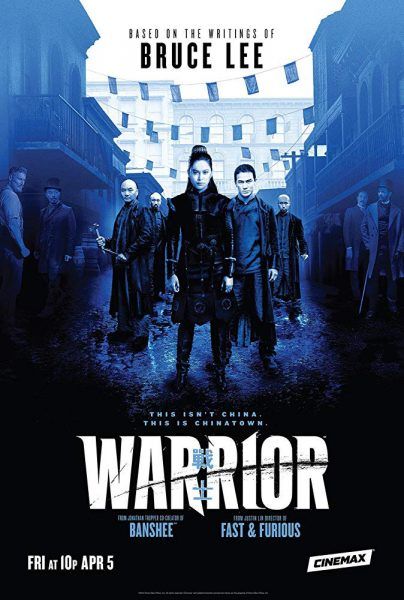From executive producers Shannon Lee and Justin Lin, and showrunner Jonathan Tropper (Banshee), the 10-episode Cinemax action-packed drama series Warrior, based on writings from martial arts legend Bruce Lee and set during the brutal Tong Wars of San Francisco’s Chinatown in the second half of the 19th century, follows Ah Sahm (Andrew Koji), a young man who’s left China behind for San Francisco under mysterious circumstances, only to realize just how challenging that can be. Now that he’s become a hatchet man for one of Chinatown’s most powerful Chinese organized crime families, violence is erupting all around him and he must decide which boundaries are worth crossing and which might be too dangerous to survive.
During this 1-on-1 phone interview with Collider, writer/executive producer Jonathan Tropper talked about how cool it is to have a hand in making a bad-ass TV series while also teaching people about real historical events, what led him to be the showrunner on Warrior, why the fight scenes are so important, what they were looking for in a leading actor, keeping the authenticity of the story while also making it appeal to modern audiences, the role that women play in this world, and how he feels like they still have a lot of story to tell.
Collider: How cool is it to not only have a hand in making a bad-ass TV series, and to finally bring to the screen something that Bruce Lee had been so passionate about, but also teaching people a thing or two about history, in the process of it all?
JONATHAN TROPPER: That’s why I jumped onto it. It’s such a new thing for me. First of all, I’ve never done period, so it was very exciting for me to take on period. I’ve also loved Bruce Lee, since I was a little kid, and I did martial arts my whole life. The idea of somehow being able to collaborate with him, there’s something very surreal and deeply enjoyable about that.
Who originally came to you about the possibility of telling this story? What was your reaction when this whole idea was presented to you?
TROPPER: It was actually the guys at Cinemax. They knew I had just decided to make Season 4 the last season of Banshee. After I had broken that news to them, a few months later, while we were getting ready to start shooting, they called me and said, “Hey, we know you’re a big Bruce Lee fan. Justin Lin and Shannon Lee just brought this project to us, and we thought maybe you guys should talk.” And I was like, “Well, sure I’ll look at it.” I didn’t expect to fall into it. I thought I’d look at it and maybe consult on it. I didn’t think I’d look at it and say, “I need to write this,” but that’s what happened.
It seems too that it’s not just important that this series got made, but that it got made in the right way. What did you feel were really the biggest keys to taking this treatment that Bruce Lee wrote, and turning it into a TV show that would take the ideas he wanted to explore, but also making it appeal to modern audiences?
TROPPER: Yeah, the thing that we were really careful about was that we wanted to really maintain the thematic integrity of what Bruce had been talking about. Even though we don’t do our show in a super realistic way, we do the graphic novel version. At the same time, we’re trying to be true, thematically, to the immigrant experience and what it felt like, both the alienation of being a Chinese immigrant in this time period. We spent a lot of time on that. And because this whole project was nixed 50 years ago, because of representation issues, we take a lot of pride in making sure that we have the right representation with our cast.
As someone who was such a fan of Bruce Lee, what were you most excited about, in getting to tell this story, and what were you most nervous about making sure you got right?
TROPPER: Well, it was the same thing, which are the fights. We felt basically that with Bruce’s name on this show, we have to have the best fights on television. I was super excited to build the fights around Bruce Lee’s aesthetic, and have nods and homages to Bruce Lee within our fights, but at the same time, we couldn’t screw it up because we’ve got the Bruce Lee name on our show, and production values have changed a lot since he made his movies in the ‘60s and ‘70s. So, it was about really making sure that our fights are the best they can possibly be, both from a choreography standpoint and from a production standpoint.
Are there times when you say, “This just isn’t good enough. We have to push further”?
TROPPER: Oh, yeah, we do that to ourselves, all the time. For us, the fights are part of the performance and story. The fights have to come out of the story. That’s why we mostly do actor-action. We almost never use stunt people to replace our actors in the fights because, for our actors, it’s part of their performance. All of that has to happen, in a way that expresses the character. Bruce Lee, himself, felt that martial arts wasn’t just for fighting, it was a means of self-expression. For us, the fights have to continue to tell the story of our characters.
Banshee became known for its fight scenes and its action because it was such a big part of the story that you were telling, and you were doing things that we don’t typically see on TV. Do you feel like your experience on Banshee and doing those fight scenes influenced the way that you wanted to approach that aspect of this?
TROPPER: Yeah, and I think it gave me the confidence. We had already done four seasons of this show that, at the time, I think had some of the best fight scenes on television. And I definitely feel that Banshee set the tone for a lot of shows that came after it. So, I felt pretty confident, having done four years of that, to step in and try to get this right. The actors work and train very hard. Brett Chan, our fight coordinator, basically runs a daily training camp.
Do you have a favorite action scene or sequence that you’ve gotten to do?
TROPPER: For me, just the thrill of doing kung fu fights is something that I’ve never done before. Banshee was much more street fights and gun fights. Being able to take Joe Taslim and Andrew Koji, and put them together and create a huge martial arts fight, the martial artist and the martial arts movie fan in me was rejoicing.
It sounds like, for the role of Ah Sahm, you were looking for someone who understood and embodied the essence of Bruce Lee and what he represented without doing an impersonation of him. When you saw Andrew Koji, did you know right away that he would be your lead?
TROPPER: What you said is exactly right, we didn’t want to try to get a Bruce Lee imitator because we felt that would be setting ourselves up for failure. We wanted to get a very brand-new, contemporary, as-yet-fairly-unknown leading man, and he needed to come with his own thing. We looked at a lot of people. We went around the world. With Andrew Koji’s audition, there was just something really different about the way he approached the character. There’s an intelligence and a quiet intensity in him that we feel does have echos of Bruce Lee, without being like Bruce Lee. You were never going to mistake him, physically, for Bruce Lee. He’s 6 feet tall, with a very different build. The idea was that we saw enough of a certain trait in him that we said, “Let’s bring him in and work with him.” So, we brought him to L.A. and we asked him to try things different ways, and we saw enough to feel confident that he was going to be able to bring a whole new set of characteristics to the character, which he did.
I love that Hoon Lee is also on this show because he was just so good on Banshee, where he played one of the best characters that’s ever been on television. Did you write that character for him, specifically, or did you write it and then think it was something he’d be good at?
TROPPER: No, I wrote the character of Wang Chao for Hoon. I wasn’t going to do a show that had a big Asian cast and not find a role for Hoon, so he was the first guy that was cast because I wrote that role for him.
Did he know that while you were writing it, or did you tell him after?
TROPPER: I kept him abreast of it. He didn’t see what the character was, but I told him because actors need to know when their next job is coming. I let him know that I was writing a role for him. This character is very different. He’s a much more masculine character, in a way. He’s a much darker character. This guy has been through a lot more, and he’s also a little more morally ambiguous than Job, who had a very clear set of morals. Both of them are people who operate outside the law, so I guess that’s what they have in common.
There are so many different layers to this show, from the brutal fight scenes to the intimate moments between characters, and the nudity and language, all set in a different time period. How do you keep the authenticity of the story while also making it appeal to modern audiences? Do you have something to help you gauge that, or is it just about your instincts?
TROPPER: I wanted to create our own reality. I wanted to create the feel of the show, so that when you’re in our show, you completely accept the rules of the world. It was clear, from the beginning, that we weren’t setting out to make the Merchant Ivory version of the 1870s, and we weren’t setting out to build something that was actually meant to be super realistic about the 1870s. We were using the 1870s, and then we were creating our own graphic novel, heightened version of that world. So, in that world, people speak in a contemporary manor, and gangsters can wear suits that are cut like our modern suits. At the same time, we are gonna stay true to the period, with what materials were available, what weapons were available, and what the world was like. It’s this balance where everything is informed by the real world, but it’s all just put through the filter of our world.
How did the idea come about to have some subtitles, but then have the audience hear them speaking in English, even though they know that they’re not actually speaking English?
TROPPER: I knew I didn’t want to make a show that was going to be half-subtitles. The other thing that was really important was that people feel very much at home in the Chinatown portion of the show. This show is being made for American audiences, and I didn’t want the Chinese characters in the show to feel more alien to the viewer than the American characters. So, it was really important to me that they spoke in way that we not only understood, but we didn’t have to think about. I think it actually works pretty well, that you end up hearing them in English. You really end up buying into their world and taking their point of view, which might have been harder to do, if they were speaking Cantonese.
What do you most enjoy about the role that women play in this world, and how you’ve seen the female characters develop? Was it important, from day one, to really give them their own voice, instead of just having them relate to and revolve around the male characters?
TROPPER: Yeah. We set out, from the beginning, to say that the women on the show had to be the true centers of power. That didn’t really happen in that time period, but so much of what we’ve done is a bit anachronistic, and we felt that was important to do. With our three lead women in Season 1, each of them is incredibly independent. No one is counting on a man to bail them out. On the contrary, all of them seem to be wonderfully dominant in their worlds, and all three of them are really in seats of power. It may not seem that way with Penny Blake yet, but you’ll see that she is quite powerful. And in Season 2, you’ll see how powerful she is. And with Ah Toy and Mai Ling, you see two women who basically answer to nobody, and are extremely powerful in their domain.
This series has technically been around for 50 years, before finally making its way to the screen now. How far ahead have you talked about or thought about this story and where the characters will go? Do you have a pretty good idea of Season 2, or have you thought further down the line than that?
TROPPER: We have actually very, very full bible for Season 2, with a full outline and everything. Beyond Season 2, we have some big bullet points, but we haven’t broken that out yet.
But it feels like you have quite a bit of world to still play in?
TROPPER: Yeah, and the beautiful thing is that, because it is a historical world, there are events in history, in that time, that are going to continue to generate more story for us. We purposely picked 1878 because it’s just a few years before the Chinese Exclusion Act, so the politics were really ramping up and the anti-Chinese sentiment was really ramping up. There’s a lot to play with, in that time period. I’m not ever worried about us running out of material.
What would you say to tease what’s still to come, this season?
TROPPER: I would say that you should absolutely know that whatever you’re expecting is not gonna happen. I think it’s actually a very surprising season, and the fun thing about our show is that there’s no way to really predict where the plot is gonna go. There are a lot of conflicting agendas and a lot of hidden agendas, and there’s a lot of emotional diversion of those agendas, which is like real life. You never know how people are gonna actually behave, in the moment. And our feeling is that there are no bad guys. It’s really just people with agendas that can’t coexist. Everyone is sympathetic, to some degree. For me, the great fun comes in doing something in the Irish world without understanding how that’s going to impact both the Chinatown world and the politicians’ world. Suddenly, these events start spilling over into each others’ world. It’s that inter-connectedness of everything that makes it a lot of fun to write.
Warrior airs on Friday nights on Cinemax.

